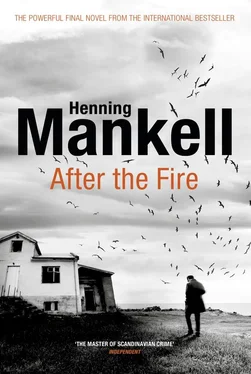I tried to call her, but I still couldn’t get through.
‘I’m here,’ I said out loud to myself. ‘I’m actually here.’
I hated the woman who had left me on the dance floor. With every step I took towards my hotel, I subjected her to increasingly vicious attacks in my head.
On a dark street just before I reached the Gare Montparnasse a drunken man came up to me and asked for cigarettes. I told him I hadn’t smoked for thirty years.
I was afraid he might attack me, but the tone of my voice clearly made him think again, and he staggered away.
I had difficulty sleeping that night. The incident in the club hurt; I was still embarrassed. I lay awake for a long time. I thought I could hear the guests in neighbouring rooms starting to make preparations to leave, and a cleaning trolley trundled past. I wondered if it was Rachel, starting work at this early hour.
It was five o’clock by the time I managed to doze off in my brown room. At eight my mobile rang; it was the embassy, a man who introduced himself as Olof Rutgersson. I wasn’t sure I understood his title.
‘We still haven’t managed to locate your daughter,’ he said.
He had a nasal voice; I’m sure it wasn’t his fault that it gave his tone an air of arrogance.
‘What happens now?’
‘We will definitely find her. After all, Paris is a city not a continent. She’s probably under local arrest, but that does mean the search will take time. I’ll be in touch as soon as I have something further to communicate on this matter.’
I wanted to protest at the way he expressed himself: ‘something further to communicate on this matter’?! But I said nothing; I needed him.
There were hardly any guests in the breakfast room, where the gigantic head of a kudu with large curly horns hung on the wall next to etchings of bridges over the Seine. Monsieur Pierre had once again been replaced by Madame Rosini, while a short Vietnamese girl took my order for coffee.
There was a bottle of sparkling wine in an ice bucket, and I couldn’t resist the temptation. My anger towards the woman who had abandoned me on the dance floor dissipated.
After breakfast I took a short walk to the railway station and bought a Swedish newspaper. When I got back to the hotel I sank down in a worn leather armchair in reception.
I liked the hotel. Lisa Modin had made a good choice. Before I started reading the paper, I asked Madame Rosini if they had received a booking for a Swedish lady. They hadn’t. She must have decided to stay somewhere else.
I leafed through the paper; it was half past ten. Rachel came down the stairs carrying a basket of cloths and cleaning products. She smiled before making a start on the glass door.
My phone rang; it was the man from the embassy.
‘Good news,’ he said. ‘We’ve found your daughter. She’s at a police station in Belleville.’
‘What on earth is she doing in that part of the city?’
‘I can’t answer that, but I’ll come and pick you up.’
Exactly one hour later a chauffeur-driven car with diplomatic plates pulled up outside the hotel. I got in beside Olof Rutgersson. He was aged about fifty and rather thin. His face was grey, colourless.
As we drove off I asked him to tell me what he knew.
‘I haven’t got much to report,’ he said. ‘We found her through our usual channels and the extraordinarily poor computer system used by the French police. That’s all I know. The important thing now is to assess her position so that we can work out how to proceed.’
‘You’re talking about my daughter as if she were a ship,’ I said.
‘It’s just words,’ Olof Rutgersson replied. ‘By the way, I suggest you let me do the talking when we arrive. I have diplomatic status. You don’t.’
He made a few calls; I noticed he had a small tattoo just above his wrist. It said MUM .
We were in a traffic jam, and Rutgersson was talking on his phone when I recognised the street, one of Haussmann’s wide boulevards.
I knew where I was. One day almost fifty years ago I had come up from the Metro exactly where our car was currently stuck in a queue of impatient drivers. It was during the period when I was working illegally, sitting in a little workshop in Jourdain repairing clarinets under the quiet guidance of Monsieur Simon. I don’t remember how I got the job, but it didn’t pay well. The workshop was in a backyard, and it was cramped and dirty. Apart from Monsieur Simon, who was a kind man, there was another young man working there who was fat, short-sighted and downright unpleasant. As soon as Monsieur Simon was out on some errand, he would start having a go at me, telling me that I was a burden because I had clumsy fingers and always arrived late in the mornings. I never argued with him, I simply despised his cowardice and wished he would drop dead among his saxophone valves.
Sometimes Monsieur Simon would send me out to various music shops to deliver instruments that had been repaired. It was as I emerged from the Metro with a parcel under my arm that I had found myself in the middle of a huge crowd. At first I thought there had been an accident, but then I realised people were waiting for someone to pass by. I peered down the road and saw President de Gaulle approaching; he was standing in an open-topped car. I had the instrument under my arm, and I made a movement with the other hand to get my cigarettes out of an inside pocket. I immediately felt two pairs of hands seize my wrist and shoulder. I dropped the clarinet. The two men, who I later realised were plain-clothes security guards, had thought I was reaching for a gun.
When they were satisfied that I had no evil intentions, and that my parcel contained a clarinet and not a bomb, they simply shrugged and let me go.
By that time the president was long gone, and the crowd had begun to disperse.
‘I once saw President de Gaulle just here,’ I said to Olof Rutgersson.
He was busy sending a text and didn’t hear what I said.
‘I once saw de Gaulle,’ I repeated. ‘Just here. Almost fifty years ago.’
‘Of course you did,’ he replied. ‘Of course you saw de Gaulle just here. Fifty years ago.’
I felt like punching him. After I’d taken his phone and chucked it out of the car window. I wished I were that kind of person. But I wasn’t.
I didn’t notice the name of the street on which the police station in Belleville was situated. Rutgersson leaped out of the car with an energy I found surprising. He had spent the journey yawning, hunched over his phone. Now he was transformed. He repeated his earlier exhortation to let him do the talking.
A young drug addict was throwing up in the shabby reception area while two uniformed officers observed him with distaste. A plain-clothes officer behind the tall desk nodded to Rutgersson when he waved his diplomatic pass. After a brief telephone call an older officer who walked with a stick emerged from another room. We accompanied him to an office where the air was thick with dust from a desk piled high with papers and shelves bellying under the weight of books and files. I had the sense of having been transported several hundred years back in time. The premises of law enforcers must have looked like this during Napoleon’s day.
The man lowered himself laboriously into the chair behind the desk; I realised he was in considerable pain. His stiff hands told me that he probably suffered from severe rheumatism.
Olof Rutgersson took the visitor’s chair on the other side of the desk and waved me to a seat by the door. He spoke fluent French. He also spoke very quickly, with the emphasis typical of those who tolerate no contradictions. I found it difficult to follow the conversation, but I did grasp that there was some doubt as to whether Louise was actually at this police station. The officer, whose name was Armand, sent for a younger colleague who couldn’t help either. When the two Frenchmen had finished talking, Rutgersson stood up and came over to me.
Читать дальше












